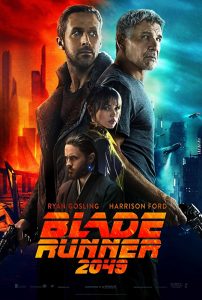
‘Blade Runner: 2049’ proves to be one of the year’s best and culturally relevant films
“Blade Runner 2049” has proven itself to be one of the best science-fiction films of 2017, as well as one of the year’s best films in general. This well-crafted sequel to the original 1982 film “Blade Runner” delivers to both old and new fans, while also proving to be one of the most culturally-relevant films of the year.
The original “Blade Runner” took place in 2019 in a dystopian future in which artificial humans, known as replicants, are created to work as slaves on “off-world colonies.” The replicants are created by the Tyrell Corporation, a company founded by Dr. Eldon Tyrell. The film centers around Rick Deckard, played by Harrison Ford, who was formerly part of a group of policemen responsible for terminating illegal replicants known as blade runners. Deckard comes out of retirement to hunt down a group of replicants that have escaped to earth.

“Blade Runner 2049” takes place 30 years after the events of the original 1982 film. Replicants are now produced by industrialist Niander Wallace, who is portrayed by Jared Leto. The original producer of replicants, the Tyrell Corporation, has been destroyed and has lost track of its original illegal replicants. The film follows K, played by Ryan Gosling, a replicant blade runner who hunts down older replicant models. The plot of the story begins when K makes a discovery that could change the entire relation between humans and replicants, leading him on a search for Deckard, who went missing 30 years ago.
2049 proves itself to be in good hands thanks to director Denis Villeneuve and his production team. The film succeeds on all levels as a Blade Runner film, with great special effects and an original story. The special effects are phenomenal, practically replicating the original film’s dark and retro future design to a modern day special effects version. Every scene depicting the Los Angeles of 2049 feels like a tribute to the futuristic vision of the original film. The sets, effects and design of the film give the viewer the impression that this much-anticipated film was made by the same production team.
As for the writing and the plot itself, the movie serves as a well-written sequel to the original, giving viewers a deeper look into the Blade Runner universe without ruining any of the characters. As far as pacing and writing goes, the film does not attempt to up the action and for the sake of modern audiences. It instead keeps a pace familiar to the previous film. With this is mind, the movie is one that demands the patience of the audience. This makes sense due to the film being co-written by Hampton Fancher, the writer of the original “Blade Runner” film.
On top of the writing and production, the performances are truly livid throughout the film. Harrison Ford’s performance as Rick Deckard, a character he has only portrayed once, compared to the many times he’s played Han Solo and Indiana Jones, is intense and arguably has more effort than some of the more familiar iconic roles Ford has recently returned to playing. Ford brings an intensity to his reprisal as Rick Deckard that truly convinces us of the tortured character he is. Next to Ford, Gosling’s performance does slightly pale in comparison, but Gosling keeps viewers interested when he is on the screen, giving viewers a fair characterization of life as a replicant hunting his own kind. Leto’s performance as Wallace is characteristic of most of his performances, managing to be convincing and effective while strangely self-aware.
The film is not without its detractors however. The film seems to be a bit too mysterious, or more so vague, with some of its characters, such as Wallace and a few others, to the point where it feels that the filmmakers are wishing to develop them later in a sequel. There is definitely greater character development that could be done regarding some of the characters. Some of the performances, such as Sylvia Hoek’s as antagonist Luv fall flat at times, or simply are not as effective as their co-stars.
The 2049 universe is driven by the idea of replicants’ roles in society, with their status being that of a discriminated minority. The plot focuses on a discovery that could shake the relations between humans and replicants and destroy the balance set in society. Like many science-fiction works, the film forces us to look back at our own society, reflecting on the corruption, discrimination and progress in our ever-evolving world. It even brings up global warming issues, due to its future being in a world where all the technology of the world has polluted the atmosphere and forced humans to resort to artificial farming. At the heart of the universe’s dystopian society, the film forces viewers to wonder whether our world of 2017 is headed in the same direction or not, and if so, think about how we can prevent such a thing.
Overall, “Blade Runner 2049” is a sequel that should please the many fans of the original because of its ability to do such a grand job paying homage to its predecessor while also acting as a good forwarding of the story.

Uh oh! Lmao! Great explaination. I love you Jared Leto!